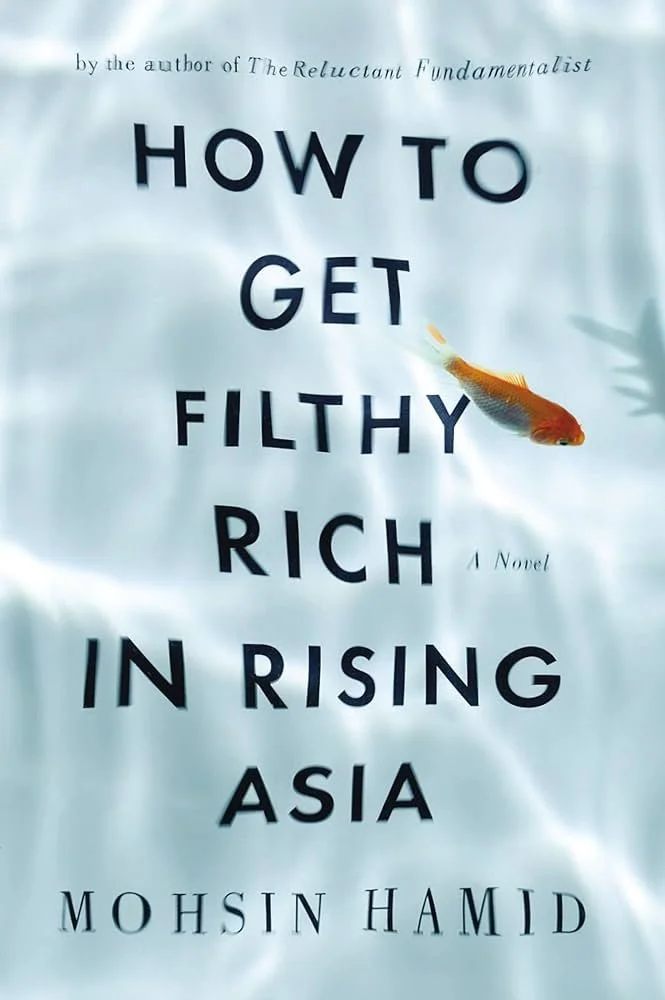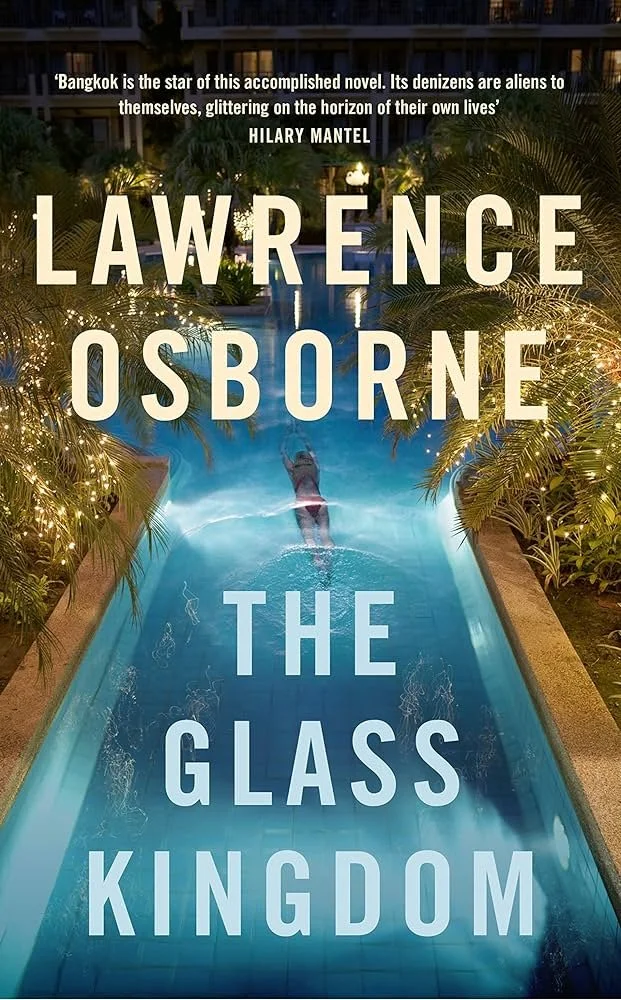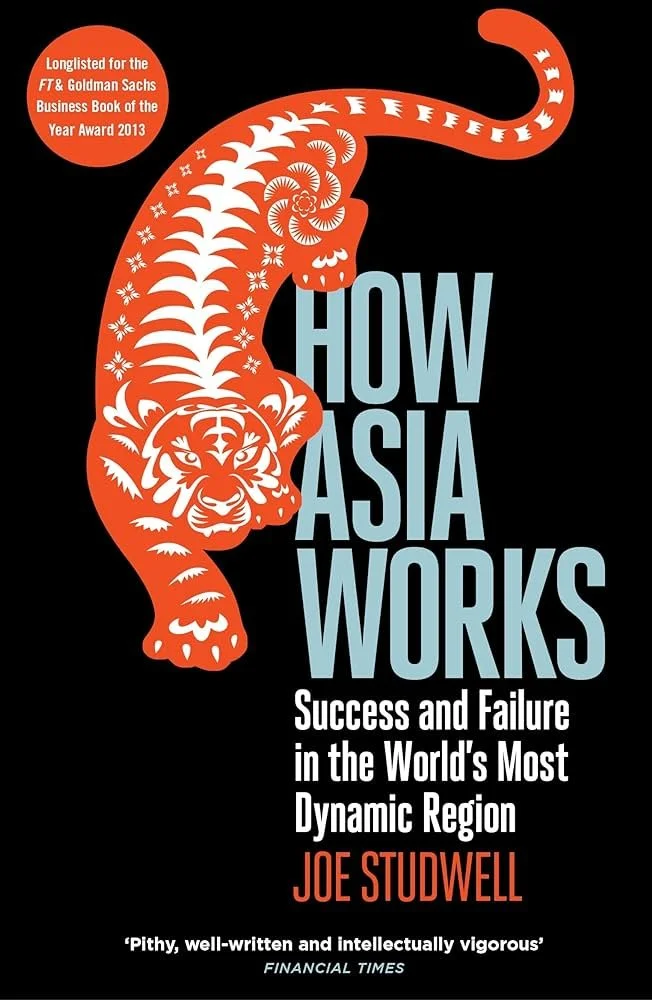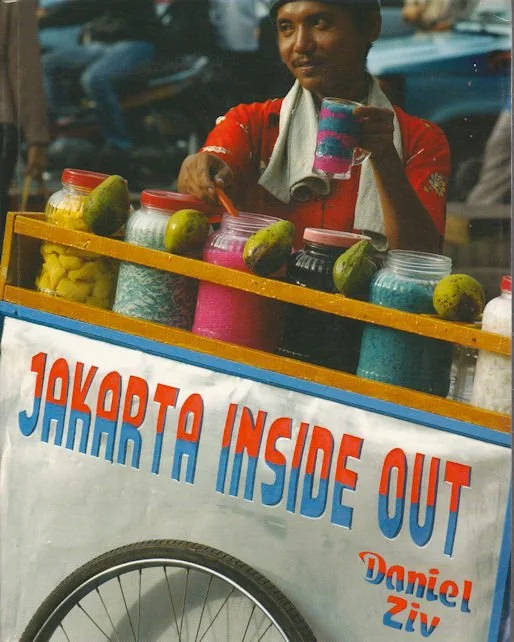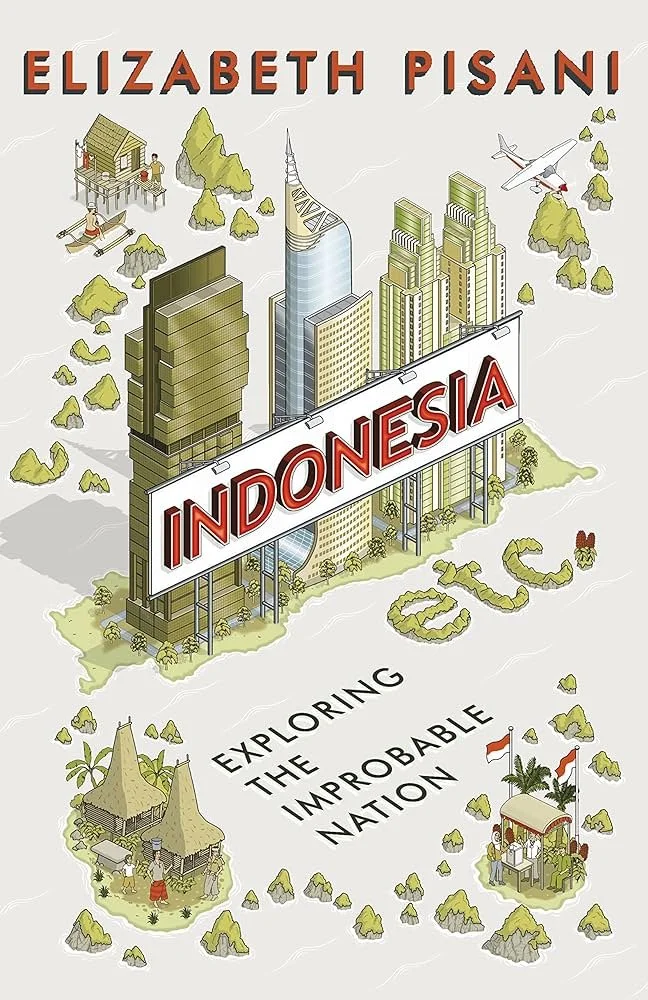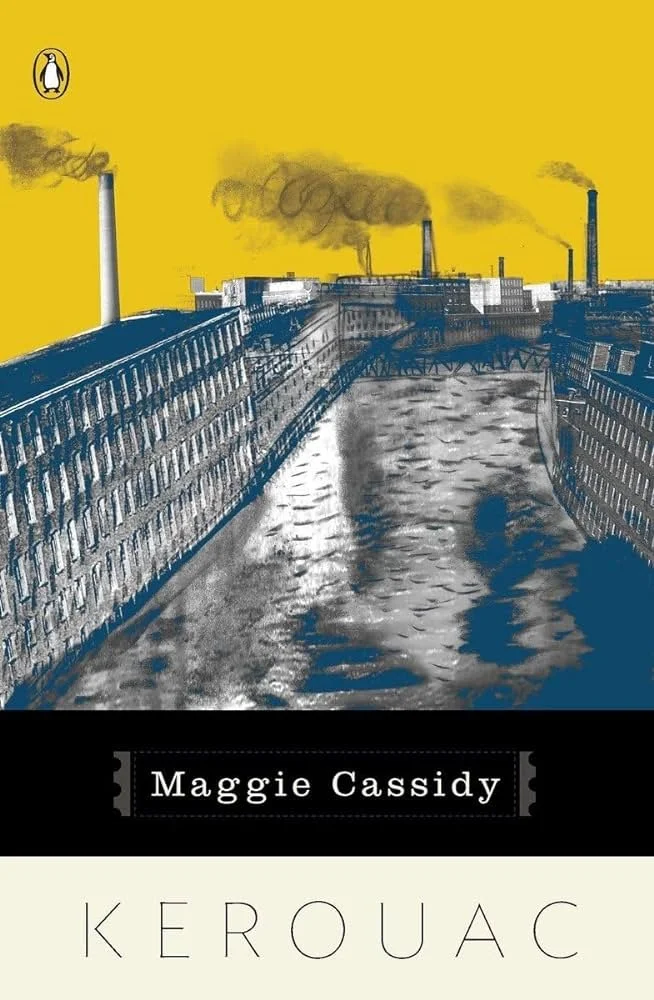The Books I Read In 2023
Page-turning thrillers, Asian economics, and journeys through Indonesia.
How to Get Filthy Rich in Rising Asia
Mohsin Hamid
Magnificent. Breathtakingly beautiful.
Words can not adequately express the fragile beauty and delicate sincerity contained within these pages. Please read this.
5 out of 5
The Glass Kingdom
Lawrence Osborne
On the run in The Big Mango, a suitcase full of cash, a sinister luxury apartment building in decay, trust nobody.
First of all, no, this is not a must-read or anything life-changing, but I thoroughly enjoyed this book from start to finish. If you're after a quick read, page-turning vacation thriller, then this fits the bill marvelously.
If you've ever lived in Asia as an expat or spent significant time in the region, you'll know just how authentically Lawrence Osborne captures the atmosphere of that part of the world through his writing.
The sights, smells, and sounds are expertly and accurately described, and it is this authenticity of exacting detail that adds a lot to the overall feeling one gets when reading his work as if you are actually there yourself.
Having spent time in Bangkok, I recognized the various streets and areas of the city that are visited. The fictional apartment building is set around the Srinakharinwirot University area in Bangkok. I realized halfway through the book that the unique portcullis design of The Kingdoms entrance is even based on a real-life, more older-style apartment complex in that area, which I recall passing by, called Chicha Castle.
Having read Osborne's "Bangkok Days" before this, I already knew he had extensive geographical knowledge of this city, and it does show. He uses this "on the ground" knowledge to a similar effect in his more recent novel "On Java Road" which is set in Hong Kong, though I unfortunately did not enjoy that book as much.
If you've experienced life as an expat in an Asian metropolis, then you've either lived in or have passed by the type of building in which most of this book is set. I found the unique setting of a once opulent, luxury skyscraper apartment building, now in a slow state of decay, to be an incredibly refreshing setting for a thriller.
The various passageways connecting each apartment tower to the other, the extensive use of glass making privacy between apartments a difficulty, the ground floor luxury pool and lush gardens an assumed refuge but in reality on complete visual show to every apartment above, the stifling, unrelenting South East Asia humidity, the constant electricity cuts swathing the entire building in oppressive darkness for nights on end, the slowly encroaching riots within the city, a separate looming fear that grows with every page turn.
The setting works incredibly well for a thriller and is probably the strongest element of the story. Osborne has created a sinister setting that hits very close to home as someone who has lived in this part of the world.
I won't go into any detail about the characters or the actual story. As with much of Osborne's work, his characters are usually the slightly weaker parts of his writing. However, with this book, I found myself thoroughly engaged in the development of each personality, and the character development was surprisingly well-tuned. Story-wise, the ending was superb.
I highly recommend this if you're after a page-turning thriller set in an area of the world that has not been utilized enough by the genre.
4 juicy mangoes out of 5
A solid page-turning thriller to consume alongside free-flow cocktails by the pool on your next holiday to South East Asia.
How Asia Works: Success and Failure in the World's Most Dynamic Region
Joe Studwell
As someone with a keen interest in the Asia region (business, politics, culture, etc.), this book was a fantastic and highly informative read. Although some of the book's elements have become slightly out of date (it was published in 2013), the gist is still extremely relevant in 2023.
To summarise the author’s blueprint of how once struggling Northern Asian countries (Japan, South Korea, and Taiwan) turned their fortunes around to become regional power players:
Initiate reforms in land ownership to distribute holdings among numerous small landholders instead of a few large ones.
Empower farmers with their own land, boosting productivity in agriculture.
Achieve food self-sufficiency, leading to lower food prices and freeing up labor for emerging industries previously occupied in agricultural tasks.
Export surplus agricultural produce to earn foreign currency, facilitating the acquisition of machinery crucial for nascent industries like textile manufacturing.
Shield fledgling industries with tariffs and subsidies initially, compensating for lower efficiency compared to established exporters elsewhere.
Tie government incentives and credit availability to export performance, compelling industries to enhance their product quality to compete globally.
Progress along the value chain, gradually increasing domestic production of components for higher-value goods.
Eventually, deregulate once the initial development phase is accomplished, facilitating further economic growth and innovation.
Studwell’s theory pertains to Northeast Asian nations becoming the regional power players they are today by following this economic blueprint towards national prosperity, while Southeast Asian nations such as Malaysia, Thailand, and the Philippines suffered due to following polar opposite national journeys.
4 out of 5
Losing the Signal: The Untold Story Behind the Extraordinary Rise and Spectacular Fall of BlackBerry
Jacquie McNish
The 2023 movie was fantastic, but this book was even better. Highly recommend this if you enjoyed the movie.
4 out of 5
Standard Deviations: Growing Up and Coming Down in the New Asia
Karl Taro Greenfeld
I first became aware of Karl Taro Greenfeld after watching the fantastic HBO Max TV series Tokyo Vice, with Greenfeld contributing as a writer on a few of the show’s episodes.
Curiosity led me to discover this early output of his career written as a gonzo-style biography of sorts while he was off galivanting around Asia in the 1990s, working sporadically as a travel writer for airline magazines (when that was still a viable source of liveable income).
So what actually is this? Well, first of all this really is not for everybody. That can’t be overstated enough; this book has not “aged” very gracefully; there’s quite a lot of extremely outdated and, to be frank, disgusting chauvinism to be found here which I at times genuinely found hard to stomach. This is an extremely warts-and-all account of a brash 20-something-year-old’s often raunchy experiences while living a wild and unsustainable lifestyle (copious amounts of hard drugs and alcohol) throughout the region.
About midway through, the author becomes addicted to a cocktail of different kinds of drugs and realizes what had initially started as an exciting life journey and genuine venture in search of personal discovery as a human has morphed into a severe drug addiction and unrelenting pointlessness. The author eventually finds himself adrift in a rapidly changing Asia with a drug addiction and no direction in life.
Unfortunately, I have personally seen many Westerners in Asia end up like the author. To his credit, the author obviously managed to find his way out of that part of his life, and he now works as a successful screenwriter.
Funnily enough, my favourite chapter was actually not a segment taken from the author's life but actually about a friend of his working in finance in Jakarta during the 1990s Asia boom. Having lived in Jakarta myself, I found the writing spot on in its description of life in the city and the whole story about his friend navigating life as a bule in the big durian curiously poignant (I won't spoil it). That specific chapter left me wanting more, and I would have loved to have heard about the author's own time spent in Jakarta.
3 out of 5
On Java Road
Lawrence Osborne
In terms of creating a life-like, realistic atmosphere where you feel as though you have been transported to the streets of Hong Kong alongside the characters, this is to Osborne's usual exceptional high quality of writing in that regard. As I mentioned in my review of The Glass Kingdom, if you have lived in Asia as an expat or spent significant time in that region of the world, you will already know how well Osborne vividly and accurately describes the sights, smells, and sounds of the region to sumptuously exacting detail.
However, as much as I have enjoyed his past work, such as the aforementioned The Glass Kingdom, reading this book felt like a hollow shell of the author's usual quality of writing overall. Story-wise, the plot falls completely flat about three-quarters of the way through, and you're left with a deeply pointless ending which, to be honest, felt like it had been completely rushed as if the author ultimately gave up on writing this and just needed to cobble something together to send it away to be published.
Reading this felt like Osborne was trying to release another The Forgiven, i.e., attempting to write something quick that could be easily transformed into a screenplay, as The Forgiven eventually was. The difference, of course, is that The Forgiven was written as a novel first, whereas this book felt as though the entire reason for writing it was to hopefully turn it into a movie.
To release this after the page-turning atmospheric thriller of The Glass Kingdom felt like a step backward.
If you were disappointed with this but still enjoy the author's distinct style of writing, I highly suggest reading his other work.
2.5 out of 5
Jakarta Inside Out
Daniel Ziv
I'm not sure how to review this fairly as it is essentially a coffee table book; however, the pictures contained inside are highly representative of day-to-day life in Jakarta. Despite its 2002 publication date, the images are still highly relevant, in my opinion, if anyone is interested in what daily life in Jakarta really looks like for locals.
I can practically smell the durian and kretek wafting off each page. A scratch-and-sniff edition is definitely in order for the follow-up.
3.5 out of 5
From Asian to Global Financial Crisis: An Asian Regulator's View of Unfettered Finance in the 1990s and 2000s
Andrew Sheng
Provides an insightful view into how old mindsets, loose monetary policy, greed, and corruption led to the late 1990s Asian financial crisis and how lessons unlearnt from said financial crisis had a flow-on effect contributing to the global financial crisis of 2008.
Mostly consisting of the author’s own personal notes and data from his own experiences of the build-up to and fallout of the events, this is an in-depth and unique study for those working in finance or with a keen interest in business and economics in the Asia region.
4 out of 5
An Empire of the East: Travels in Indonesia
Norman Lewis
Better than anything Paul Theroux has ever written. Period.
4 out of 5
The Year of Living Dangerously
Christopher J. Koch
Sumptuously descriptive of mid-1960s Sukarno-era Jakarta.
“Swift evening spreads across Jakarta. The city lies inert in a hot brown twilight, which smells of petrol, frangipani, and fear. All energy burns low, like the failing street lights; but fear mounts like erotic excitement in these stormy nights of the north-west monsoon.”
As for the actual story and characters, while I didn't dislike this book, I did find it a tad dull, and the ending was downright anti-climatic after the long buildup.
Also, for people with extremely cushy, plum positions as foreign correspondents in Asia in the 1960s (an eventful time period in this region's history), the journalists in this book sure like to complain a lot. They carry on like a bunch of "get off my lawn" types at the best of times, constantly complaining about the Indonesian locals whom they obviously look down upon as inferior to them in every way.
Look, I get it. It's the 1960s, and they are a bunch of old-school cantankerous journalists in Jakarta, but having lived in Jakarta as an expat myself and knowing how incredibly warm, helpful, and downright friendly Indonesians actually are as humans, it ground my gears a bit...
Rating: 3 out of 5
Heart of a Dog
Mikhail Bulgakov
Utterly bonkers.
3 out of 5
Indonesia, Etc: Exploring the Improbable Nation
Elizabeth Pisani
A magnificent accomplishment, what Elizabeth Pisani achieved here is truly remarkable.
I've visited Bali plenty of times for holidays. However, it wasn't until I lived in Jakarta for work that I formed a deep interest in Indonesian history and its many different and diverse cultures. Already knowledgeable in Balinese, Javanese, and, to a lesser extent, Sundanese and Betawi cultures, I was delighted to discover that Pisani dedicates the majority of this book to exploring the other less-talked-about islands, regions, and, with it, less well-known cultures that make up the vast Indonesian archipelago.
You can tell that the author deeply loves and admires the people of Indonesia, which clearly shows in the writing. The book does start to fall off towards the end, the writing quality begins to dip, and overall, the book starts to feel rushed, beginning around the time when Pisani is traveling through Aceh and North Sumatra until the end of their journey. This is understandable considering the vast amount of (literal) ground the author covered to write this book in the first place (26,000 miles!); however, it was definitely something I noticed. Unfortunately, the book's last quarter does read as though the author was in a mad dash to send it off to publishing.
All in all, if you have even the slightest particular interest in Indonesia or even the region of Asia as a whole. I highly recommend Indonesia, Etc.
This book is approaching a decade in age, and some parts of it are slightly dated already. However, I would still call it relevant in 2023.
4 out of 5
Maggie Cassidy
Jack Kerouac
I first read this as a 15-year-old. I recently picked it up off a bookshelf and re-read it at my parents' house while I was visiting them in 2023. I was obsessed with On The Road as a teenager, and I remember enjoying this seemingly lighthearted novella as well.
So, is liking Kerouac less and less a “thing”?
This was a chore to read the second time around.
2 out of 5
Street of Eternal Happiness: Big City Dreams Along a Shanghai Road
Rob Schmitz
Poignant, beautifully written, and strangely haunting at times.
Not a masterpiece, but spending time with these colorful inhabitants of a Shanghai street was a true delight. And at other times, absurdly hilarious:
Mr. Clean put his hand on my shoulder. "Here," he said, giving me a Heavenly Happiness package. "The restroom's down the hall. Go put one inside your underwear."
I reflexively crossed my legs. "Um... no, thanks," I said. Mr. Clean's facial tic fired once more before turning into a frown. "I've used them for two months. They're very comfortable. You won't feel a thing." I shook my head. "It'll boost your sex drive!" Mr. Clean assured me, smiling. "You're a journalist, right? You should try it so that you can report on it from your own personal experience." "I report on China's economy, not on sexual health pads," I said firmly.
"Then maybe you can report on my husband's other company," said Mr. Clean's wife. "He's the CEO of a helicopter business. In ten years, everyone will be riding around in helicopters! There's an eighty percent chance of it getting launched," she said confidently.
Mr. Clean nodded. I glanced over at him and imagined what his life must be like: one day recruiting people to sell underwear pads, the next day, selling shares of his commuter-helicopter scheme to poor people.
4.5 out of 5

